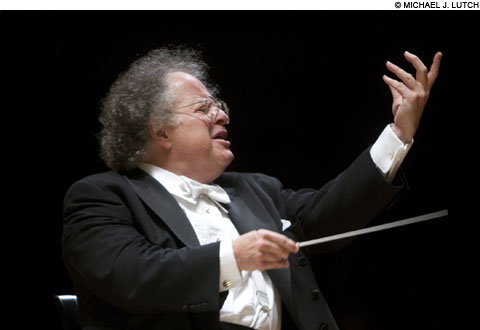
POST-EXIT STRATEGIES After several years of will-he-or-won’t-he drama, BSO subscribers are being tossed into another potentially drawn-out period of uncertainty. |
In late June 1999, just days before his 25th-anniversary Boston Symphony season was due to continue at Tanglewood, Seiji Ozawa tendered his resignation as BSO music director. I was in my second year with the orchestra's press office, and we were forced to delay our seasonal move west to Lenox in order to stay in the city and deal with the announcement. It was all very cloak-and-dagger; I remember we had to come up with some silly excuse to tell our co-workers why we weren't packing up as scheduled.
This past week, Ozawa's successor, James Levine, ended his BSO tenure after seven seasons, citing challenges regarding his health and the "ensuing absences they have forced." Since leaving Symphony Hall almost five years ago, I've been watching the Levine saga unfold, gritting my teeth with every notice of malady and ensuing cancellation. Hailed by many as a genius on stage, Levine has been plagued by myriad health problems (and a few cases of bad luck) almost since his arrival here: a torn rotator cuff suffered in a 2006 on-stage fall; 2008 kidney surgery to remove a cancerous cyst; back surgery in 2009 and 2010. All cost Levine and the BSO time on the podium; last season alone, he was forced to miss half of his BSO concerts in Symphony Hall and the entire season at Tanglewood. It's affected his other gig as well — as music director of the Metropolitan Opera — but he's keeping that job. Boston, it turns out, was too much.
One orchestra, two music-director searches. In a lot of ways, this one will be like the last: the search committee forms, a job description is put together, names are thrown out. But this search could be very different. When Ozawa stepped down, he gave the orchestra three years' notice. The deal with Levine was announced in October 2001, nearly two and a half years later, but because of commitments at a third orchestra, the Munich Philharmonic, he was unable to take the job in Boston full time until the start of the 2004 season. Until then, he served as music director designate, appearing for a single program each in 2002-'03 and 2003-'04.
The BSO gets no such buffer this time around. Levine's resignation is effective September 1, forcing management into contingency mode, not just for his remaining Symphony Hall programs and this week's East Coast tour, but also for this summer at Tanglewood, where Levine teaches as well as conducts, and next year's BSO schedule, which was nearly finished but now must be recast. (The fate of Levine pet projects, such as the conclusion of a two-year cycle of John Harbison symphonies, is unknown.)
Although six months' notice is better than nothing, Levine's spotty health means he may have already led his last performances as Boston's music director. And though BSO officials maintain that they'll take whatever time is needed to get the best conductor for the job, it remains to be seen how well the orchestra and its audience will weather another long gap between music directors.